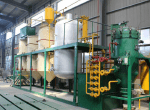Edible oil is a fundamental ingredient in cooking and food production, making the edible oil refining process a crucial part of the food industry. Among the various components and machinery involved in this process, boilers stand out as indispensable workhorses. In this comprehensive guide, we will delve into the intricate world of edible oil refining, highlighting the key role that boilers play at every stage. From the pre-treatment to the final product storage and packaging, we will uncover the significance of boilers and the critical role they play in ensuring the quality and safety of edible oils.
Understanding Edible Oil Refineries
Before we dive into the significance of boilers, it’s essential to grasp the basics of edible oil refineries. The edible oil refining process is designed to remove impurities and unwanted elements from crude vegetable oils to produce high-quality, safe, and nutritious cooking oils. This process involves a series of intricate steps, with each stage playing a specific role in transforming crude oils into edible ones.
Edible oil refineries consist of various components, including degumming tanks, neutralization vessels, bleaching units, deodorization towers, and storage tanks. While all these components are essential, boilers are a linchpin in the process due to their ability to provide the necessary heat and steam required for many crucial operations.
The Significance of Boilers
Boilers, in the context of edible oil refineries, are essentially vessels designed to generate steam through the combustion of fuel. The generated steam is then used in various stages of the refining process. Let’s explore the significance of boilers in greater detail:
Steam Production:
Boilers are primarily responsible for producing high-pressure steam, which is indispensable in the edible oil refining process. Steam is used to transfer heat and energy throughout the refinery, making it an essential component for several crucial operations.
Heating Processes:
The edible oil refining process often involves heating the oil to specific temperatures for various chemical reactions to occur. Boilers provide the necessary heat for these processes, ensuring that the oil is treated effectively.
Temperature Control:
Precise temperature control is critical in every stage of the refining process. Boilers play a pivotal role in maintaining the required temperatures, which is crucial for achieving the desired quality and consistency in the final product.
Types of Boilers Commonly Used
There are different types of boilers used in edible oil refineries, each with its own set of advantages and applications. The choice of boiler depends on factors like refinery size, energy efficiency goals, and the specific requirements of the refining process. Some common types of boilers used in the industry include:
Fire-Tube Boilers:
These boilers use a cylindrical shell with a firebox at one end and tubes containing hot gases. Fire-tube boilers are known for their simplicity and ease of maintenance, making them suitable for small to medium-sized refineries.
Water-Tube Boilers:
Water-tube boilers, on the other hand, have water-filled tubes that circulate through a furnace where combustion takes place. They are ideal for larger refineries due to their high capacity and efficiency.
Functions of Boilers in Edible Oil Refineries
Now, let’s delve into the specific functions that boilers perform in different stages of the edible oil refining process:
Pre-Treatment Stage:
Removal of impurities often involves heating the crude oil to break down gums and solids.
Boilers provide the necessary heat for this pre-treatment stage, ensuring that the oil is ready for subsequent processing.
Neutralization Stage:
Boilers are essential for maintaining precise temperatures during the neutralization process, where acids are removed from the oil.
Steam may also be used to facilitate mixing and reaction in this stage.
Bleaching Stage:
Bleaching involves the removal of pigments, impurities, and undesirable odors from the oil.
Boilers play a critical role in heating the oil and activating bleaching earth to enhance the purification process.
Deodorization Stage:
Deodorization is a crucial step in eliminating unwanted odors and flavors from the oil.
Boilers provide the steam required for stripping volatile compounds from the oil, leaving it with a neutral taste and odor.
Final Product Storage and Packaging:
Boilers are used in the generation of steam for cleaning and sterilizing containers and equipment before packaging.
Steam may also be used for pasteurization to extend the shelf life of the final product.
Efficiency and Safety Considerations
Boiler efficiency is a paramount concern in edible oil refineries, as it directly impacts energy consumption and production costs. Energy-efficient boilers not only reduce operational expenses but also contribute to sustainability by minimizing fuel consumption and emissions. Regular maintenance and monitoring of boilers are essential to ensure safety and efficiency within the refinery.
Energy Efficiency and Sustainability
In recent years, there has been a growing emphasis on sustainable practices within the edible oil refining industry. The responsible use of energy and resources is not only environmentally friendly but also economically advantageous. Boilers play a crucial role in this endeavor, and several technologies and innovations are being employed to make boiler operations more sustainable.
Challenges and Solutions
Despite their importance, boilers in edible oil refineries face various challenges, including maintenance issues, fuel costs, and emissions control. However, innovative solutions are continually being developed to address these challenges. Case studies of successful implementations can provide valuable insights into how refineries are overcoming these obstacles.
Conclusion
Boilers are the unsung heroes of the edible oil refining process, providing the essential heat and steam required to transform crude oils into high-quality, safe cooking oils. From pre-treatment to packaging, they play a pivotal role in ensuring the quality, efficiency, and sustainability of the refining process.
As the edible oil industry continues to evolve, the significance of boilers in this intricate process remains unwavering, contributing to the production of cooking oils that grace kitchens worldwide.



